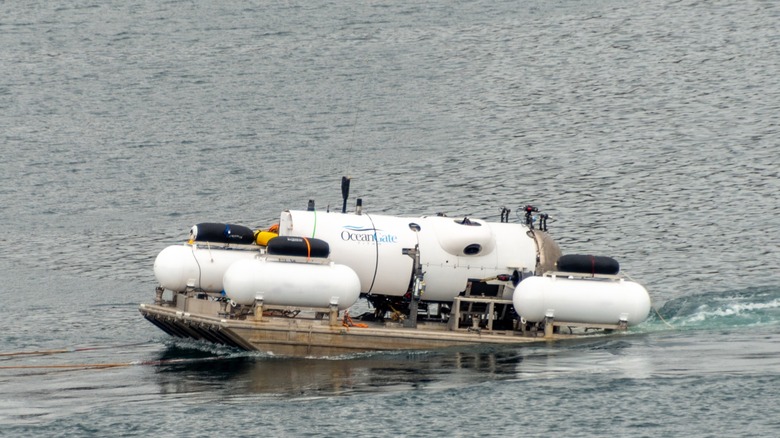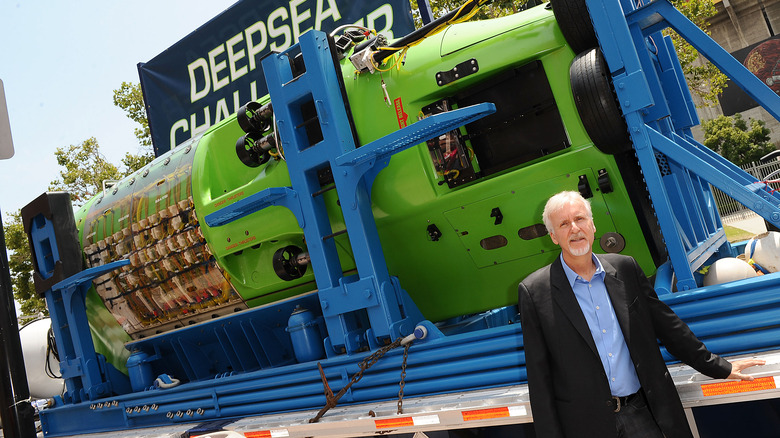James Cameron Likens The Titan Submarine Tragedy To Titanic's Disastrous End
Those aboard the Titan deep sea submersible which went missing on Sunday while en route to the wreck of the Titanic have now been presumed dead, and "Titanic" director and deep-sea explorer James Cameron has some words of reflection in the wake of the tragedy.
Speaking to ABC News, Cameron drew a sharp parallel between the recent disappearance of the Titan and the historic tragedy of the boat it was meant to explore. Due to the fact that it was advertised as unsinkable, the sinking of the RMS Titanic has become a colloquial parable for a situation in which flouted safety measures and unfounded arrogance led to a calamity that could otherwise have been prevented. "I'm struck by the similarity of the Titanic disaster itself," Cameron noted, "where the captain was repeatedly warned about ice ahead of his ship and yet he steamed at full speed into an ice field on a moonless night and many died as a result. It's a very similar tragedy at the exact same site. It's astonishing and really quite surreal."
Cameron theorized the Titan had imploded on Monday
James Cameron is no stranger to deep sea exploration, nor to exploring the RMS Titanic, in particular. For his 1997 epic, "Titanic," Cameron took cameras beneath the waves to capture the sunken wreck, thus heightening the realism of the film. To do so, he used submersibles not unlike the Titan. And in 2012, he descended six miles under the waves to explore the Mariana Trench, estimated to be the deepest area of Earth's oceans, using a submersible of his own design.
As an expert on the subject, Cameron quickly became concerned with the Titan's situation. "The first I heard of it was Monday morning," the director told CNN. "I immediately got on my network because it's, you know, a very small community in the deep submergence group and found out some information within about a half hour that they had lost comms and they had lost tracking simultaneously."
Cameron continued by discussing how he immediately came to the conclusion that the Titan had imploded. "A shock wave event so powerful that it actually took out a secondary system that has its own pressure vessel and its own battery power supply, which is the transponder that the ship uses to track where the sub is," he explained. "So I was thinking of implosion then. That's Monday morning..."
Indeed, Cameron's worst fears came to life, as The Wall Street Journal reports that the United States Navy heard a sound similar to an implosion on Sunday, hours after the sub had descended. A Navy official confirmed to the outlet that an acoustic data analysis was conducted and it "detected an anomaly consistent with an implosion or explosion in the general vicinity of where the Titan submersible was operating when communications were lost..."
Cameron highlights safety-first amidst deep sea submersible dives
Given the filmmaker's relevant experience, he had some harsh words regarding the now highly publicized lapses of judgment that doomed the Titan. "It's absolutely critical for people to get the take-home message that deep submersible diving is a mature art," Cameron told ABC News, referring to the loss of the Titan and its passengers as the greatest fear of the submersible diving community. He continued by asserting that the Titan expedition was widely considered to be unsafe before its voyage down. "Many people in the community were concerned about this sub and even wrote letters to the company saying what they were doing was too experimental and what they were doing needed to be certified," the director remarked.
Indeed, reports since Sunday have indicated a number of red flags, irregularities, and safety concerns were known to OceanGate Expeditions, the Titan's operator, prior to its final, fatal voyage. CNN reported several prior issues with the small exploratory vessel, including a battery issue, a rebuilt hull, and another trip that was called off when an OceanGate submersible lost contact with its ship after dropping only 37 feet beneath the surface.


